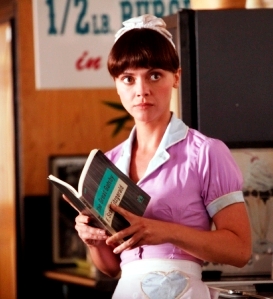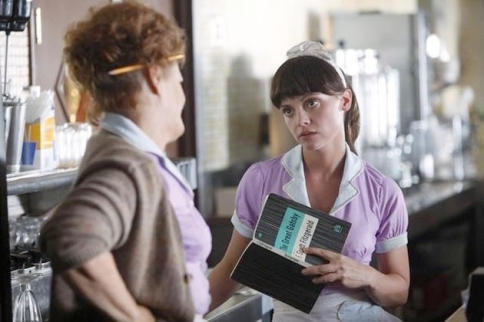While the retro cameras in Pan Am, the TV series were rather obvious an observation, there was another aspect that went a bit deeper. I am talking about the literature that shaped the 60s. References to some of the literary classics were a genius of an idea to not just create an atmosphere of the 60s but show what books and ideas shaped the age.
The first instance is in the episode where the wealthy playboy Ted Vanderway (Is the surname supposed to phonetically recall New York’s powerful Vanderbilt dynasty?) shows off to Dean in the cockpit claiming that reading The Feminine Mystique would help him attract girls. Referring to a seminal book from the second wave of feminism is a good idea but introducing it as a flirting tip was a bit chauvinistic in my opinion. It would have made more of an impact if say Maggie (who obviously would have read this book) were to refer to it. However, I can imagine the layperson on the street would have reacted in exactly this way to a book that focuses on women and their problems.
In Unscheduled Departure, the clipper Majestic is forced to land in a hostile territory because a passenger suffers a heart attack. When the boys are away trying to get help, Maggie, Laura and Kate hold the fort. Maggie is saddled with a passenger who proves to be a handful. A group of rebel soldiers (who also happen to be black) with guns on their shoulders walk into the flight. The passengers all stiffen immediately. Remember, the 1960s was also the height of the civil rights movement. While a deathly silence descends on the stranded flight, it is Laura who remains unfazed. She has the presence of mind to ask with composure and politeness what they would like. It turns out they would like some food. So while Laura attends to them, Maggie turns to her difficult passenger and says,
“How did Hemingway describe fear, Mr. Ortiz? Was it grace under pressure? Oh no. I’m sorry. That’s how he described courage. So, while she takes care of the men with the guns, why don’t you sit down and I’ll make you a nice cup of tea.”
A few episodes later, Maggie’s past comes to haunt her. Shown in staggered flashback episodes, it turns out that Maggie is not quite the Genuine Article she has portrayed herself to be. Her list of literary transgressions is long and varied.
 Image via
Image via
 Image via
Image via
First, she reads The Great Gatsby while waitressing in Washington in 1959. The job is obviously not suited to her intelligence or temperament. One day, a trucker tips her less to challenge her to get out of there. Which she does.
Second, she impersonates a Pan Am stewardess in her next job as a secretary at the registrar’s office at Berkeley. Maggie takes all the classes that a student (who is also a Pan Am hostess) drops because of her busy schedule. She shines in the literature class. When the professor asks the students to pick a character that they identify with, she unwittingly picks Gatsby. This is interpreted as a sign of deception by the professor, which turns out to be not too far from the truth.
Next, she lies to get the attention of the interviewers of Pan Am, who are not willing to give her a chance because she is late. She literally screams in the hallway,
“I’ve had my heart broken twice. Once by a boy named chip, the other by a man named F. Scott Fitzgerald.”
F. Scott Fitzgerald continues to open doors for her. This last minute tactic works, and she gets the job. Maggie is an obviously intelligent woman who uses ethically questionable ways to get ahead in life because the world back then did not offer that many intelligent pursuits to an ambitious woman.
Also in the same episode, Nick Lonza watches Martin Luther King Jr’s famous I Have a Dream speech playing on the TV in a bar. Literature does not exist in a vacuum; it is influenced by events in the society. Showing the Martin Luther King Jr speech touches on the larger social implications outside the narrow group of characters that the series focuses on. The speech is also a plot device that is developed throughout the series to keep Nick and Kate away from each other.
When the year changes at midnight in the episode 1964, the entire cast watches the fireworks go off at the stroke of midnight with a line that summarizes the year for each of them. Maggie not surprisingly pegs her line on literature: she references Charles Dickens.
Dean: Goodbye 1963.
Maggie: It was the best of times it was the worst of times.
Laura: And I loved every minute of it.
Colette: I love us.
Laura: And this. I love this.
 Image via
Image via
Pan Am proves that a lighthearted retro drama can have depth. The chosen theme is not obviously linked to the academic or literary worlds but still creates a holistic picture of the zeitgeist by referencing various literary works.
Note: Have I missed out any other instances? If I have, please let me know and I will update this entry. Thanks!
Awesome is the word, moush for such a deep deep analysis of a soap. You really inspire me to delve deeper into things and look for meanings and associations. Of course, nothing exists in vacuum. Beautiful review; keep it up girl!
Hey Hannah! Thanks re! You make me feel like a literary rockstar even though I am far from it. 🙂
I adored Pan Am for the fact that it succeeded in creating the 60’s ambiance, with all the cultural references (don’t forget the JFK speech in Berlin). It’s saddening that they stopped it. Do you happen to know any other TV shows that were able to form the same impression?
Hi Reem! That makes the two of us. That’s true. It is sad. I don’t think so but I’d like to think there are some TV shows out there that I have not come across.